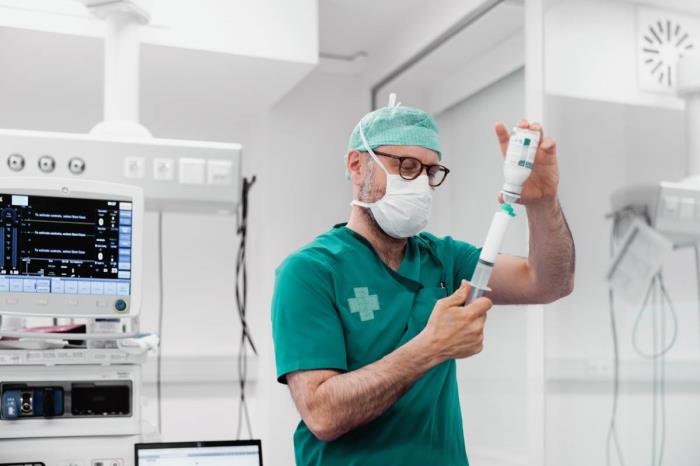Anesthesia is a medical intervention used to prevent pain and discomfort during surgical procedures. It can be classified into three main types: general, regional, and local anesthesia. General anesthesia renders the patient completely unconscious and is typically administered through intravenous drugs or inhaled gases. This type is commonly used for extensive surgeries, including full body lifts, as it ensures the patient is entirely unaware of the procedure.
Medical disclaimer: This content is for general awareness and does not replace a doctor’s consultation. For diagnosis or treatment decisions, consult a qualified specialist.
The Importance of Anesthesia in Full Body Lift Surgery
Anesthesia plays a crucial role in full body lift surgery, ensuring patient comfort and safety throughout the procedure. Given the extensive nature of a body lift, which often involves multiple areas of the body, effective anesthesia is vital for preventing pain and anxiety. The choice of anesthesia impacts not only the surgical experience but also the recovery process.

Proper anesthesia management helps maintain stable vital signs and ensures that patients remain relaxed and pain-free during the operation. Additionally, advancements in anesthetic techniques contribute to quicker recovery times and reduced postoperative complications, enhancing overall patient satisfaction with the surgical experience.
Preoperative Assessment for Anesthesia
Before undergoing a full body lift surgery, a comprehensive preoperative assessment for anesthesia is essential. This evaluation typically involves reviewing the patient's medical history, including previous surgeries, allergies, and current medications. The anesthesiologist will assess the patient’s overall health, focusing on factors such as heart and lung function, to determine the most appropriate anesthesia plan.
During this assessment, patients are encouraged to discuss any concerns or fears regarding anesthesia. This dialogue helps ensure a tailored anesthetic approach, taking into consideration the individual’s health status and the specific requirements of the surgical procedure.
General Anesthesia vs. Local Anesthesia in Body Lift Procedures
In body lift procedures, the choice between general and local anesthesia depends on the extent of the surgery and patient preferences. General anesthesia is often preferred for full body lifts due to the complexity and length of the operation. It allows for complete unconsciousness, enabling the surgeon to perform extensive work without causing discomfort to the patient.
Conversely, local anesthesia may be suitable for less invasive body contouring procedures or when combined with sedation. While local anesthesia provides targeted numbing, it may not adequately address the discomfort associated with extensive surgeries like body lifts. Ultimately, the decision is made collaboratively between the patient and the surgical team, considering the specific circumstances of the surgery.
The Anesthesia Team: Roles and Responsibilities
The anesthesia team plays a vital role in the surgical process, ensuring the safe administration and monitoring of anesthesia during full body lift surgery. This team typically includes an anesthesiologist or nurse anesthetist, who is responsible for developing the anesthesia plan, administering anesthetics, and monitoring the patient's vital signs throughout the procedure.
In addition to managing anesthesia, the team is trained to recognize and respond to potential complications, ensuring patient safety at all times. They also provide preoperative education, helping patients understand the anesthesia process and what to expect during and after surgery. The collaborative efforts of the anesthesia team are essential for a smooth surgical experience and optimal outcomes for patients.
How Anesthesia Enhances Patient Comfort During Surgery
Anesthesia plays a critical role in enhancing patient comfort during surgery by providing sedation, pain relief, and muscle relaxation. This allows patients to undergo procedures like a full body lift without experiencing discomfort or anxiety, contributing to a more positive surgical experience.
Monitoring Patients Under Anesthesia During Full Body Lift
Continuous monitoring of patients under anesthesia during a full body lift is essential to ensure their safety and well-being. Anesthesia providers use advanced equipment to track vital signs such as heart rate, blood pressure, and oxygen saturation, allowing for immediate interventions if any issues arise.
Risks and Complications Associated with Anesthesia
While anesthesia is generally safe, it does carry some risks and complications, including allergic reactions, respiratory issues, and cardiovascular events. Patients should discuss their medical history and any concerns with their anesthesiologist to mitigate potential risks before undergoing a full body lift.

The Recovery Process: Awakening from Anesthesia
The recovery process from anesthesia begins as patients are gradually awakened after surgery. Initially, they may feel groggy or disoriented, but this typically subsides within a few hours. Monitoring continues during this phase to ensure a smooth transition and to address any discomfort or complications.
Pain Management Strategies Post-Surgery
Effective pain management post-surgery is crucial for recovery after a full body lift. Physicians often prescribe a combination of medications, including opioids and non-steroidal anti-inflammatory drugs (NSAIDs), and may recommend adjunct therapies like ice packs or physical therapy to alleviate discomfort.
Factors Influencing Anesthesia Choices for Body Lift Surgery
Several factors influence anesthesia choices for body lift surgery, including the patient's medical history, the extent of the procedure, and any previous reactions to anesthesia. An experienced anesthesiologist will evaluate these factors to recommend the most suitable anesthesia plan for optimal safety and comfort.
The Role of Anesthesia in Minimally Invasive Techniques
Anesthesia plays a significant role in minimally invasive techniques by allowing patients to remain comfortable and pain-free during procedures. Techniques such as tumescent anesthesia or local anesthesia with sedation enable surgeons to perform body lifts with smaller incisions, reducing recovery time and complications.
Innovations in Anesthesia Technology for Surgical Procedures
Innovations in anesthesia technology have significantly improved the safety and effectiveness of surgical procedures. Advanced monitoring systems, regional anesthesia techniques, and more precise drug delivery methods enhance patient outcomes and comfort during surgeries, including full body lifts.
Preparing Patients for Anesthesia: Guidelines and Recommendations
Preparing patients for anesthesia involves following specific guidelines and recommendations, such as fasting before surgery, disclosing medications, and discussing any allergies or medical conditions. This preparation is essential to minimize risks and ensure a successful surgical experience.
How Anesthesia Affects Surgical Outcomes
Anesthesia can significantly affect surgical outcomes by influencing factors such as pain management, patient comfort, and overall recovery. Optimal anesthesia techniques can enhance surgical precision, reduce complications, and improve patient satisfaction following a full body lift.
Patient Education: What to Expect from Anesthesia
Patient education is vital for understanding what to expect from anesthesia during a full body lift surgery. Patients should be informed about the types of anesthesia that may be used, the monitoring process, potential side effects, and the recovery experience. Clear communication with the anesthesia team helps alleviate anxiety and ensures patients feel prepared and comfortable.
Addressing Common Myths About Anesthesia
There are several myths surrounding anesthesia that can cause unnecessary anxiety for patients. One common misconception is that anesthesia will make patients feel pain during surgery, but in reality, it is designed to block pain and provide comfort. Educating patients about these myths can help them understand the safety and efficacy of modern anesthesia practices.
Anesthesia and its Impact on Recovery Time
Anesthesia can significantly impact recovery time following a full body lift. Generally, patients may experience grogginess and disorientation as they awaken from anesthesia, but advancements in techniques can lead to quicker recovery. Efficient pain management and monitoring contribute to a smoother transition to post-operative care, allowing for faster mobilization and discharge.
The Future of Anesthesia in Cosmetic Surgery
The future of anesthesia in cosmetic surgery promises to enhance safety and patient satisfaction. Innovations such as personalized anesthesia plans, enhanced monitoring technologies, and new anesthetic agents aim to minimize side effects and optimize recovery. As techniques continue to evolve, patients can expect improved outcomes and a more comfortable surgical experience.
Exploring Non-Surgical Alternatives to Full Body Lift Surgery
Investigate non-surgical alternatives to full body lift surgery that can offer body contouring benefits without the need for invasive procedures. Treatments like ultrasound therapy, radiofrequency skin tightening, and injectable fillers can help improve skin laxity and body shape, catering to those seeking less invasive options.
Understanding the Legal and Ethical Aspects of Cosmetic Surgery
Delve into the legal and ethical considerations surrounding cosmetic surgery. This includes informed consent, patient rights, and the responsibilities of surgeons, helping prospective patients navigate the complexities of cosmetic procedures while ensuring they make informed decisions.
Best Full Body Lift Surgery Treatment in India
The Best Full Body Lift Surgery Treatment in India is performed by expert surgeons who utilize advanced techniques to ensure optimal outcomes for patients, offering a personalized treatment plan tailored to individual health needs.
Best Full Body Lift Surgery Hospitals in India
The Best Full Body Lift Surgery Hospitals in India are equipped with cutting-edge technology and facilities, providing top-notch care, including pre-surgery consultations, surgical expertise, and post-operative recovery support to ensure a smooth patient journey.
Full Body Lift Surgery Cost in India
When considering the Full Body Lift Surgery Cost in India, patients benefit from affordable and transparent pricing at leading hospitals, which offer cost-effective treatment options without compromising the quality of care.
Best Full Body Lift Surgery Doctors in India
The Best Full Body Lift Surgery Doctors in India are highly experienced in performing the surgery, utilizing a patient-centric approach that ensures personalized care, precise surgical techniques, and dedicated follow-up care to enhance recovery.
FAQs About Anesthesia in Full Body Lift Surgery
What type of anesthesia will be used for my full body lift surgery?
The type of anesthesia used can vary based on the procedure's extent and individual patient factors, typically including general anesthesia or a combination of local anesthesia and sedation.
Will I feel pain during the surgery?
No, the purpose of anesthesia is to block pain and ensure comfort throughout the procedure, so patients should not feel any pain during the surgery.
How long will the effects of anesthesia last after surgery?
The effects of anesthesia can last a few hours after surgery, with patients gradually regaining full consciousness and clarity.
Are there any risks associated with anesthesia?
While generally safe, anesthesia does carry some risks, such as allergic reactions or respiratory complications. Discussing medical history with the anesthesia team helps mitigate these risks.
What should I do to prepare for anesthesia before surgery?
Preparation may include fasting for a certain period, informing your healthcare team of any medications or allergies, and discussing any health concerns prior to surgery.